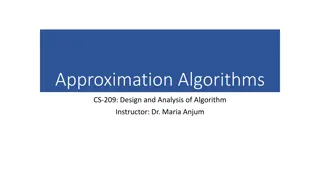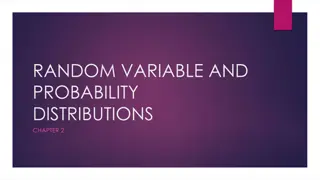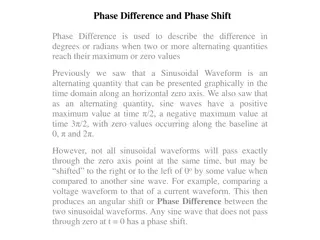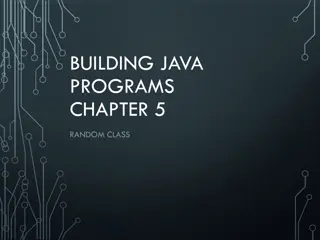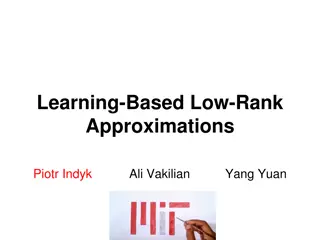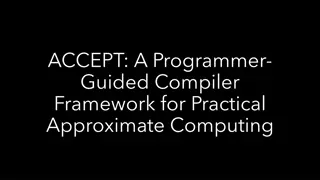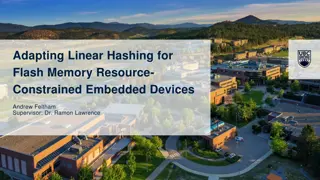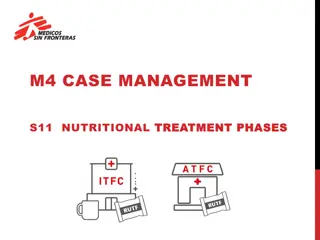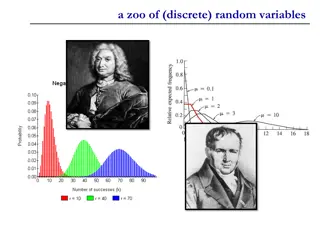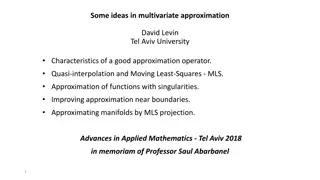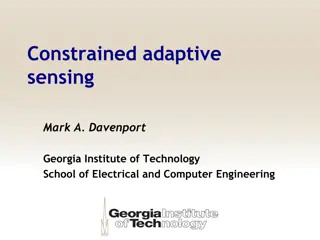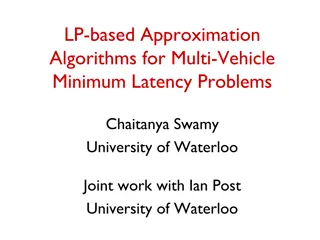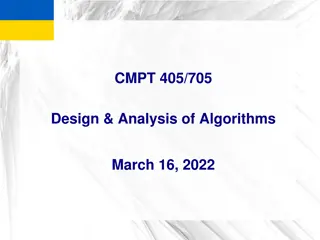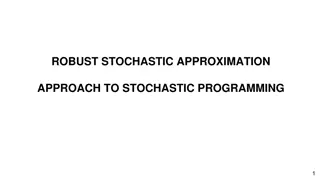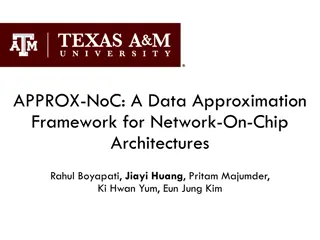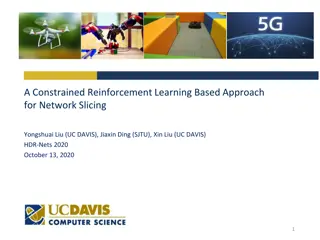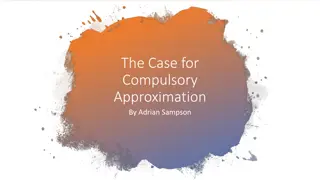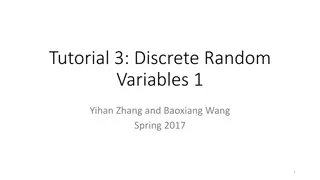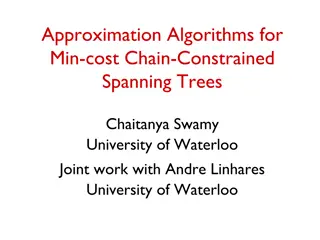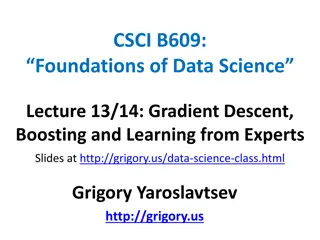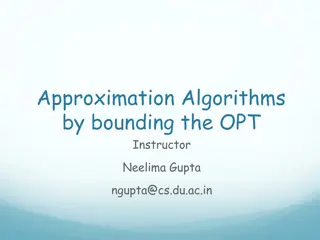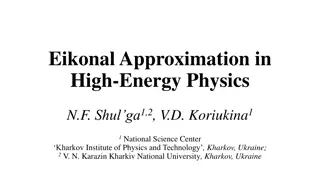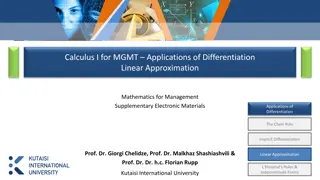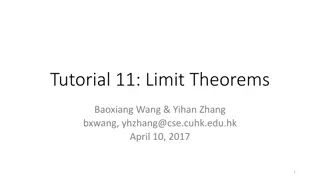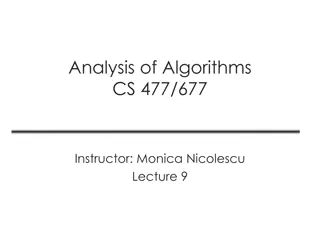Approximation Algorithms: Types, Terminology, and Performance Ratios
Approximation algorithms aim to find near-optimal solutions for optimization problems, with the performance ratio indicating how close the algorithm's solution is to the optimal solution. The terminology used in approximation algorithms includes P (optimization problem), C (approximation algorithm),
4 views • 10 slides
Random Variables and Their Applications in Various Fields
Random variables play a crucial role in statistics, engineering, and business applications. They can be discrete or continuous, depending on the nature of the outcomes. Discrete random variables have countable values, while continuous random variables can take on any real number. This article explor
1 views • 6 slides
Random Variables and Probability Distributions
Random variables are variables whose values are unknown and can be discrete or continuous. Probability distributions provide the likelihood of outcomes in a random experiment. Learn how random variables are used in quantifying outcomes and differentiating from algebraic variables. Explore types of r
2 views • 13 slides
Phase Difference and Phase Shift in Sinusoidal Waveforms
Phase difference and phase shift describe the angular displacement of sinusoidal waveforms in degrees or radians. These concepts are crucial in analyzing the relationship between alternating quantities such as voltage and current. The phase angle determines the shift of a waveform along the horizont
4 views • 26 slides
Electron-Phonon Interactions in Iron-Based Superconductors
This discussion explores the effects of electron-phonon interactions on orbital fluctuations in iron-based superconductors. Topics covered include ab initio downfolding for electron-phonon coupled systems, evaluation methods such as Constrained Random Phase Approximation (cRPA), Constrained Density-
0 views • 12 slides
Random Class in Java Programming
The Random class in Java is used to generate pseudo-random numbers. By utilizing methods such as nextInt and nextDouble, you can generate random integers and real numbers within specified ranges. This chapter explores common usage scenarios, such as generating random numbers between specific ranges
2 views • 10 slides
Learning-Based Low-Rank Approximations and Linear Sketches
Exploring learning-based low-rank approximations and linear sketches in matrices, including techniques like dimensionality reduction, regression, and streaming algorithms. Discusses the use of random matrices, sparse matrices, and the concept of low-rank approximation through singular value decompos
0 views • 13 slides
ACCEPT: A Programmer-Guided Compiler Framework for Practical Approximate Computing
ACCEPT is an Approximate C Compiler framework that allows programmers to designate which parts of the code can be approximated for energy and performance trade-offs. It automatically determines the best approximation parameters, identifies safe approximation areas, and can utilize FPGA for hardware
1 views • 15 slides
Adapting Linear Hashing for Flash Memory Constrained Embedded Devices
This research explores the adaptation of linear hashing for improved data handling on flash memory-constrained embedded devices. Motivated by the increasing data collection by IoT devices, the study focuses on implementing database structures like a linear hash table for efficient data processing. T
0 views • 67 slides
Nutritional Treatment Phases in Pediatric Malnutrition
This session covers the different phases of nutritional treatment in pediatric malnutrition programs, focusing on objectives, specifics, and criteria for transitioning between phases. An illustrative case of Annika, a 3-year-old in the Transition Phase, is provided for practical application and unde
1 views • 5 slides
A Zoo of Discrete Random Variables
Discrete random variables play a crucial role in probability theory and statistics. This content explores three key types: Bernoulli random variable, binomial random variable, and error-correcting codes. From understanding the basics of Bernoulli trials to exploring the application of error correcti
0 views • 27 slides
Advanced Techniques in Multivariate Approximation for Improved Function Approximation
Explore characteristics and properties of good approximation operators, such as quasi-interpolation and Moving Least-Squares (MLS), for approximating functions with singularities and near boundaries. Learn about direct approximation of local functionals and high-order approximation methods for non-s
1 views • 9 slides
Constrained Adaptive Sensing and Benefits of Adaptivity
Constrained adaptive sensing involves estimating sparse signals with constraints, utilizing strategies like nonadaptive sensing and adaptive sensing. Benefits of adaptivity include reducing errors and improving estimation accuracy in signal processing. It explores the potential for improvement in re
0 views • 17 slides
LP-Based Approximation Algorithms for Multi-Vehicle Minimum Latency Problems
The research discusses LP-based approximation algorithms for solving Multi-Vehicle Minimum Latency Problems, focusing on minimizing waiting times for vehicles visiting clients starting from a depot. Various cases, including single- and multi-depot scenarios, are explored, and significant improvement
0 views • 28 slides
Approximation Algorithms in Design & Analysis of Algorithms
Uncover the world of approximation algorithms in the realm of Design & Analysis of Algorithms. Delve into topics like 7/8 approximation for Max-3-SAT, Quick Sort with random pivot, and the 7/8 approximation for Max-3-CNF with in-depth explanations and proofs of the algorithms involved.
0 views • 16 slides
ROBUST STOCHASTIC APPROXIMATION APPROACH TO STOCHASTIC PROGRAMMING
Discussed are stochastic optimization problems, including convex-concave saddle point problems. Solutions like stochastic approximation and sample average approximation are analyzed. Theoretical assumptions and notations are explained, along with classical SA algorithms. Further discussions delve in
0 views • 41 slides
Effective Indexing for Approximate Constrained Shortest Path Queries
Large road networks present challenges for exact Constrained Shortest Path (CSP) queries. Existing solutions are expensive or impractical due to lack of indexing. A proposed solution, COLA (COnstrained LAbeling), leverages the planar nature of road networks for efficient approximate CSP processing.
0 views • 18 slides
Randomized Algorithms and Independence Concepts
Types of independence in randomized algorithms are explored alongside the concept of random bit complexity and generation. The idea of mutually independent random variables versus pairwise independent random variables is discussed, illustrating how to generate uniformly random and pairwise independe
1 views • 18 slides
Random Number and Variate Generation Overview
Random numbers play a crucial role in modern computing, aiding in cryptography, simulation, and system testing. This overview delves into the properties of random numbers, the generation of pseudo-random numbers, techniques for generating them, and tests for their validity. It explores the significa
0 views • 59 slides
Approximation Algorithms: Tackling NP-Hard Problems
Delve into the realm of approximation algorithms to solve NP-hard optimization problems efficiently and effectively. Explore the concept of NP-hardness, approximation ratios, and strategies for finding near-optimal solutions. Understand the trade-offs between accuracy and complexity in algorithm des
1 views • 10 slides
Approximation Algorithms for NP-complete Problems
Dive into the world of approximation algorithms for NP-complete problems like Min Vertex Cover with a focus on providing good but not optimal solutions. Explore various approximation techniques and algorithms to tackle these challenging computational problems efficiently.
0 views • 36 slides
Theory of Approximation: Interpolation
In the study of approximation theory, interpolation plays a crucial role in representing data points using polynomials and splines. This content discusses the concepts of interpolation polynomials, including Newton's Divided Difference and Lagrange Polynomials, as well as spline interpolation techni
0 views • 16 slides
Greedy Approximation Algorithm for MAX SAT
Study a simple greedy approximation algorithm for MAX SAT problem, where the goal is to maximize the weight of satisfied clauses using Boolean variables and clauses with weights. Discuss approximation algorithms, deterministic algorithms, LP relaxation, and randomized rounding techniques.
1 views • 42 slides
Topological Phase Transitions Seminar
This seminar on topological phase transitions, presented by Melda Akyazi, covers topics like XY model, spin wave approximation, vortices, experimental realization, and more. It discusses N-Vector models, Ising model, XY model, Heisenberg model, and the characterisation of phase transitions based on
1 views • 40 slides
Green: A Framework for Energy-Conscious Programming
Programmers often approximate functions and loops without quantifying the error or benefits, leading to maintenance challenges. The Green framework addresses this by quantifying tradeoffs in performance, energy consumption, and quality of service through a controlled approximation approach. It allow
0 views • 24 slides
Data Approximation Framework for Network-On-Chip Architectures
Data Approximation Framework for Network-On-Chip Architectures presented by Rahul Boyapati, Jiayi Huang, Pritam Majumder, Ki Hwan Yum, Eun Jung Kim explores the concept of approximation in NoCs to achieve higher throughput, mitigate memory bandwidth bottleneck, and increase data similarity for impro
0 views • 31 slides
Constrained Reinforcement Learning for Network Slicing in 5G
Explore how Constrained Reinforcement Learning (CRL) is applied to address network slicing challenges in 5G, enabling efficient resource allocation for diverse services like manufacturing, entertainment, and smart cities. Traditional optimization methods are compared with learning-based approaches,
0 views • 23 slides
Exploring Compulsory Approximation in Technology Domains
Delve into the concept of compulsory approximation in various technology domains highlighted by Adrian Sampson. Discover the benefits, challenges, and application of compulsory approximation techniques in machine learning and parallel computing methods like Hogwild. Uncover how existing approximatio
0 views • 19 slides
Discrete Random Variables and Associated Probability Functions
Explore the concept of discrete random variables, their associated probability mass functions, and examples of typical discrete random variables like the Binomial and Poisson random variables. Understand the difference between discrete and continuous random variables with practical examples.
0 views • 19 slides
Chain-Constrained Spanning Trees: Approximation Algorithms and Constrained MST Problems
Explore approximation algorithms for minimizing costs in chain-constrained spanning trees, delving into constrained MST problems with a focus on degree constraints. Learn about the challenges, previous algorithms, and the search for efficient solutions within these constraints.
1 views • 27 slides
Optimizing Constrained Convex Functions for Data Science Success
Explore the principles of constrained convex optimization, gradient descent, boosting, and learning from experts in the realm of data science. Unravel the complexities of non-convex optimization, knapsack problems, and the power of convex multivariate functions. Delve into examples of convex functio
0 views • 18 slides
Understanding Approximation Algorithms by Bounding the Optimum
Dive into the world of approximation algorithms and learn how to find solutions close to the optimum for NP-Complete problems using bounding techniques. Explore factor-2 algorithms, lower bounding the OPT, and potential improvements in approximation guarantees.
0 views • 33 slides
Approximation Algorithms in Optimization Problems
Explore the world of approximation algorithms in optimization problems, where we seek the best solutions efficiently but not always optimally. Learn about NP-hardness, approximation ratios, and a clever algorithm for finding an approximation for Vertex Cover.
0 views • 30 slides
High-Energy Physics: Eikonal Approximation and Atom Chains
Explore the eikonal approximation in high-energy physics, focusing on charged particle scattering and atom distribution functions in different media. Learn about the Born approximation and its application in scattering on atom chains. Discover the impact of coherence effects and how potential energy
0 views • 12 slides
Greedy Approximation Algorithm for MAX SAT
Explore a simple greedy approximation algorithm for MAX SAT, a problem in Boolean variables and clauses. Learn about approximation algorithms and deterministic methods for maximization, LP relaxation, and randomized rounding.
0 views • 42 slides
Random Number and Variate Generation Overview
Discover the importance of random number generation, including pseudo-random numbers and their applications in computing, cryptography, and simulation. Explore historical methods and properties of random numbers for effective simulation and system testing. Learn about the uniformity and independence
0 views • 59 slides
Linear Approximation in Mathematics for Management with Florian Rupp
Explore the role of linear approximation in mathematics for management, understanding the behavior of functions near a point, quality of approximation, and its applications in this comprehensive guide by Prof. Dr. Florian Rupp. Learn about tangent lines, polynomial approximations, and the accuracy o
0 views • 9 slides
Limit Theorems Tutorial: Central Limit Theorem & Normal Approximation
Understand the Central Limit Theorem and Normal Approximation with examples and calculations. Learn how to apply De Moivre-Laplace Approximation to solve binomial problems. Explore the concept of zero mean and unit variance and its implications in probability theory. Dive into a problem related to a
0 views • 27 slides
Understanding Spline Interpolation for Polynomial Approximation
Learn about spline interpolation for polynomial approximation, including linear and cubic splines. Understand how to construct cubic splines passing through given points using MATLAB. Discover the advantages of piecewise-polynomial approximation over single polynomial approximation in function appro
0 views • 23 slides
Analysis of Algorithms CS 477/677 Lectures on Random Variables, Expectation, Indicator Random Variables, and Quick Sort
Learn about random variables, expectation, indicator random variables, and the analysis of randomized Quicksort algorithm in these CS 477/677 lectures by Instructor Monica Nicolescu. Understand concepts such as discrete random variables, expected value calculations, and the workings of randomized Qu
0 views • 37 slides
